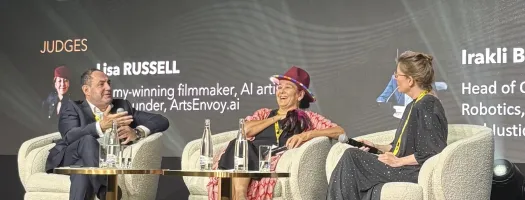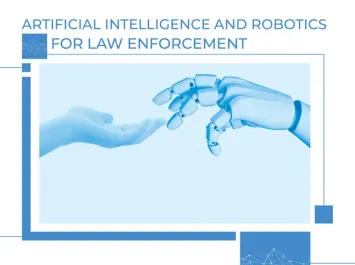Launched at the AI for Good Global Summit: a new animated video and a practical guide to help families understand and talk about generative AI.
Adolescents are increasingly turning to generative AI: to do their homework, get inspired, create stories, or simply have someone to talk to. Yet, most parents are often not aware this is happening.
That lack of awareness is one of the key insights from the latest research presented by the UNICRI Centre for AI and Robotics at the AI for Good Global Summit. The findings are part of the broader initiative AI Literacy for Children: New Skills for a Changing World, generously supported by The Walt Disney Company. The project aims to equip families with the knowledge and tools they need to navigate the growing presence of generative AI in children's lives.
Meet Mia: A Journey into the Digital Unknown of AI
To help young people approach these tools more thoughtfully, UNICRI created a short, animated video that introduces key AI concepts like large language models, bias, hallucinations, and digital safety through the eyes of a relatable teen character.
The story follows Mia, an adolescent preparing a school presentation about her dream career, except she’s completely unprepared. Her solution? Asking an AI chatbot for help.
What follows is a colourful journey into a digital world where Mia learns how generative AI works, what it can and cannot do, and how it might play a role in her future. Along the way, she discovers not only how to use the technology, but also how to ask better questions, evaluate information critically, and recognise the boundaries between human and machine.
The video was directed by Ricardo Megre and premiered at the AI for Good Film Festival. This world premiere was accompanied by an inspiring panel discussion with Steven Vosloo from UNICEF, Yalda Aoukar from Bracket Foundation, and Irakli Beridze, head of the Centre for AI and Robotics of UNICRI.
“AI is very powerful, but it is not human and has limitations such as bias and hallucinations. These are all concepts that children need to understand and learn at school, the same way they learn to use a calculator for maths”, explained Irakli Beridze during the panel discussion, where the need for AI literacy among children and parents was referred to several times.
Yalda Aoukar added that “children are native AI users while parents struggle to keep up in the age of generative AI. It’s important to close this generational gap and parents need to be more informed of how children are using these tools. Parents must overcommunicate about the digital risks, the same way they explain physical risks to their children.”
A Guide for Parents - Understanding AI’s Risks and Opportunities
To address the AI knowledge gap among parents, UNICRI produced an AI literacy Guide which focuses on four elements: Communicate, Learn, Explain and Monitor. This richly illustrated parental guide is designed to turn confusion into conversation and provide tips on how to:
- explore AI together as a family,
- set age-appropriate boundaries,
- discuss misinformation and inappropriate content,
- and support emotional well-being in the digital age.
It reminds parents that forbidding technology often backfires and that the real key lies in building trust, asking questions, learning together and staying involved.
The guide also includes real data, practical advice, and links to trusted resources from UNICEF, Common Sense Media, and others.
The guide highlights both the risks and the benefits of generative AI for children. Some of the risks are:
Over-reliance on chatbots may affect reasoning and social skills
Inappropriate content can be generated or encountered accidentally
Emotional dependency on AI companions can impact well-being
Privacy risks are real: children may unknowingly share personal data
Academic dishonesty and impersonation are rising concerns
But there are also many opportunities, when the technology is used in a responsible way:
- Personalised learning through adaptive prompts and explanations
- Creative expression, from storytelling to image generation
- Increased digital literacy and awareness of misinformation
- Support for neurodivergent learners, thanks to multimodal interfaces
AI literacy video and guide: the research behind them
To produce the video and the parents’ guide, UNICRI has engaged with adolescents, parents and experts in the field.
The project drew on a series of expert interviews with professionals from leading organisations in the field, including UNICEF, OpenAI, LEGO Group, Harvard University, OECD, Bodhini, the Bracket Foundation, Common Sense Media, and Everyone.AI. Their insights helped guide the development of practical advice for parents and caregivers on responsible digital parenting in the age of AI.
Adolescents’ viewpoints were also included in the development of these resources, in the form of an interactive workshop and survey delivered to a class at Rijswijk Lyceum in the Netherlands.
To understand parents’ views on how their children are adopting generative AI and how it might affect their cognitive and social development, a global survey was conducted worldwide, gathering responses from 160 parents across 19 countries and five continents. The findings resulted in a research paper published at the Interaction Design and Children (IDC) Conference 2025.
Beyond the lack of communication between parents and adolescents, the analysis reveals that parents’ perceptions are closely linked to their own level of experience with the technology. Those who use AI tools themselves tend to view its impact on adolescents' development more positively than those with little or no exposure to it.
The research offers a first-of-its-kind look into what parents know, feel, and worry about when it comes to AI. The results speak for themselves:
49% of parents have never spoken to their child about generative AI.
44% feel they lack the knowledge to guide their children on safe AI use.
40% do not monitor their child’s use of generative AI tools.
82% do not think their child spends too much time chatting with AI chatbots.
Only 20% of parents believe their child has advanced knowledge of AI—despite evidence that adolescents are already relying on it regularly.
87% of parents who use generative AI themselves believe that, overall, it can have a positive impact on their children.
And yet, worry is common. Many parents are concerned that frequent AI use could diminish creativity, reduce critical thinking, or foster dependency. Others fear that chatbots are becoming emotional crutches, replacing real-world communication.
The only way to address these worries and bring out the positive impacts of AI, according to both experts and respondents, is AI literacy and awareness of child rights for all stakeholders; parents, children, AI developers and policy-makers alike.
A New Kind of Literacy
The project invites us to rethink what it means to be literate today—not only the ability to read and write, but also the capacity to understand how technology influences the way we think, connect with others, and make decisions.
To prepare the next generation for this reality, the project advocates for the integration of AI literacy into school curricula, ensuring that young people acquire not only technical understanding but also the critical and ethical skills needed to navigate an AI-driven world.
Mia’s story is fictional, but the questions she faces are real. With the resources launched at the AI for Good Global Summit, families now have new ways to explore those questions—together.
Because the future of AI isn’t just about coding. It’s about empathy, responsibility, and the ability to ask not just "can I use AI for this?" but "should I use AI for this?".
Let’s help children grow up not just surrounded by technology, but ready to shape it.



